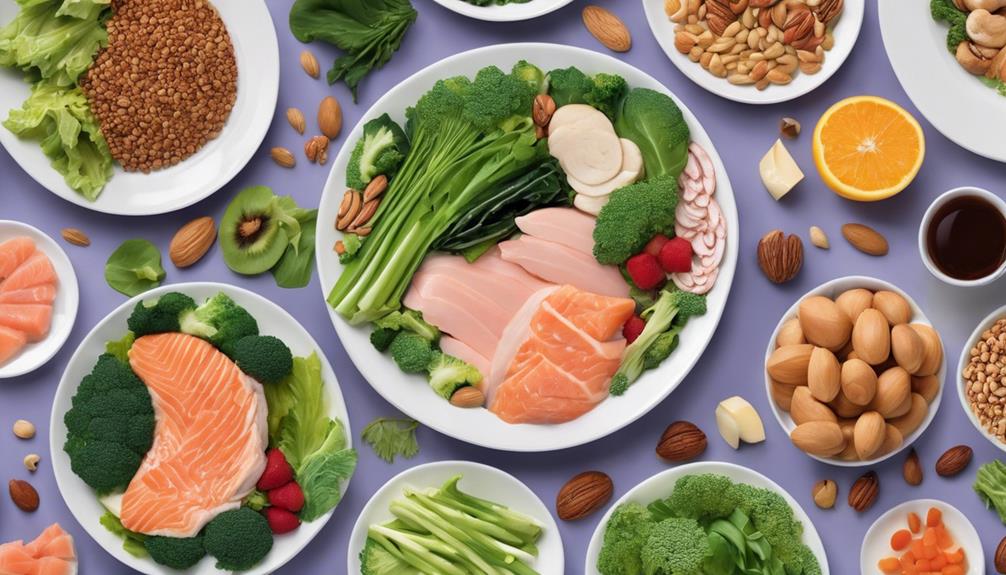As the saying goes, 'you are what you eat,' and when it comes to breastfeeding, our diet plays a pivotal role in nurturing both mother and baby.
Understanding the essential components of a breastfeeding mother's diet is key to ensuring top-notch health and well-being for both. From caloric requirements to specific nutrients needed, this guide offers a roadmap to support the unique nutritional needs of nursing mothers.
So, let's explore the essential components of this essential diet guide and discover how it can pave the way for a healthy breastfeeding journey for both mother and baby.
Key Takeaways
- Breastfeeding mothers need an additional 330-400 daily calories for milk production.
- Prioritize essential nutrients like iodine (290 mcg) and choline (550 mg) for baby's development.
- Include protein-rich foods, vegetables, fruits, and whole grains in the diet for optimal nutrition.
- Consult healthcare providers for personalized advice on supplements and balanced diet for breastfeeding.

Legendairy Milk Liquid Gold Lactation Support | Lactation Supplement with Organic Goats Rue, Milk Thistle, Shatavari, Fennel, Alfalfa & Anise | Breastfeeding Supplements, 60 Count
𝐒𝐓𝐄𝐏 𝐔𝐏 𝐘𝐎𝐔𝐑 𝐋𝐀𝐂𝐓𝐀𝐓𝐈𝐎𝐍 𝐆𝐀𝐌𝐄 – Liquid Gold is a powerful blend of 6 certified organic ingredients well-known…
As an affiliate, we earn on qualifying purchases.
As an affiliate, we earn on qualifying purchases.
Caloric Needs for Breastfeeding Mothers
Breastfeeding moms typically require an additional 330 to 400 calories daily to support the production of breast milk. Understanding that the energy demands during lactation are unique, and meeting these needs is critical for both the mother's health and the quality of the milk produced. Factors such as age, BMI, activity level, and the intensity of breastfeeding can impact caloric requirements. By utilizing tools like the DRI Calculator and following the guidance provided by the USDA and HHS Dietary Guidelines for Americans, breastfeeding mothers can estimate their specific calorie needs more accurately.
Adequate calorie intake plays a significant role in sustaining energy levels and meeting the demands of breastfeeding. Without enough calories, mothers may feel fatigued, which can affect their overall well-being. Ensuring a balanced diet that includes the necessary additional calories can support milk production and help moms feel more energetic throughout the day. Prioritizing a nutrient-dense diet to support both maternal health and the needs of the growing baby is essential.

Now Supplements Choline 300 mg, 100 Veg Capsules – Supports Nervous System and Liver Health*, Vegan
Essential Nutrient Support: Choline is an essential water-soluble nutrient that is often categorized as a B vitamin
As an affiliate, we earn on qualifying purchases.
As an affiliate, we earn on qualifying purchases.
Essential Nutrients for Breastfeeding Moms

Ensuring the best intake of essential nutrients is vital for supporting the health and development of both mothers and their breastfed infants. As breastfeeding mothers, we must pay close attention to our intake of certain key nutrients to promote the optimal growth of our little ones. Here are some important facts to consider:
- Iodine: Breastfeeding moms require 290 mcg daily to support thyroid function and baby's brain development.
- Choline: Intake of 550 mg daily is crucial for aiding in brain and nervous system development in infants.
- Food Sources: Incorporate dairy, seafood, eggs, and iodized salt in your diet to meet iodine requirements.
- Supplements: Healthcare providers can assess the need for iodine or choline supplements to ensure both you and your baby are receiving adequate nutrition.
Let's prioritize these nutrients in our diets to provide the best start for our little ones' brain development and overall health.

Nature Made Postnatal Multivitamin + DHA 200 mg, Postnatal Vitamins for Women, Includes Iron, Vitamin D3, Calcium, Iodine & More for Breastfeeding Moms, 60 Softgels
60-DAY SUPPLY, ONE DAILY SOFTGEL: Adults take 1 softgel daily with water and a meal. Each serving (1…
As an affiliate, we earn on qualifying purchases.
As an affiliate, we earn on qualifying purchases.
Foods to Include in Breastfeeding Diet
Let's focus on nourishing our bodies with a variety of nutrient-rich foods to support both our own health and the well-being of our little ones during breastfeeding. It is crucial to include a balanced mix of foods in our diet to make sure we're providing the best for our babies. Here are some key foods to include:
| Food Group | Benefits |
|---|---|
| Protein-rich foods | Support milk production and tissue repair |
| Vegetables | Essential vitamins, minerals, and antioxidants |
| Fruits | Vitamins, fiber, and hydration |
| Whole grains | Sustained energy and digestive health |
| Water | Support milk production and postpartum recovery |

Munchkin® Milkmakers® Lactation Cheddar Crisps for Breastfeeding Moms with Oats and Flax, 6 Count
Made with ingredients traditionally used to support breast milk supply, like oats and flax seed
As an affiliate, we earn on qualifying purchases.
As an affiliate, we earn on qualifying purchases.
Foods to Limit or Avoid While Breastfeeding

Limiting certain foods while breastfeeding is important to guarantee the health and safety of both the mother and the baby. Here are some important points to keep in mind:
- Limit alcohol intake: Any amount of alcohol in breast milk is considered unsafe for the baby, so it's best to avoid it altogether.
- Watch caffeine intake: Keep caffeine consumption to 2-3 cups a day to prevent agitation in your little one.
- Avoid seafood high in mercury: Be cautious of consuming fish like shark, swordfish, king mackerel, and tilefish as they can pose risks to the baby's developing nervous system.
- Be mindful of allergies: Foods like peanuts, dairy, soy, wheat, and eggs can commonly cause allergies in babies. Monitor your baby for any reactions after consuming these foods and consult a healthcare provider if needed.
Being aware of these restrictions and making informed choices will help ensure a happy and healthy breastfeeding journey for both you and your baby. If you ever have doubts or questions, don't hesitate to seek guidance from a healthcare provider.
Special Diet Considerations for Vegans/Vegetarians
For vegan and vegetarian mothers breastfeeding their babies, it is essential to pay close attention to specific dietary considerations to guarantee the best health for both mother and child. As vegan or vegetarian diets may lack sufficient vitamin B12, critical for nerve function and DNA synthesis, supplementation is recommended to prevent deficiencies. Additionally, iron intake from plant-based sources may be less bioavailable, necessitating careful monitoring to make sure adequate levels for breastfeeding mothers. Healthcare providers play a pivotal role in evaluating the need for iron and other nutrient supplements, especially for those following vegan or vegetarian diets. Consulting with healthcare providers can provide guidance on maintaining a balanced diet that supports both the mother's health and breastfeeding needs. Below is a table highlighting key considerations for vegan and vegetarian breastfeeding mothers:
| Nutrient | Importance | Sources |
|---|---|---|
| Vitamin B12 | Essential for nerve function and DNA synthesis | Fortified foods, supplements |
| Iron | Important for oxygen transport in the body | Legumes, nuts, seeds, tofu |
| Nutrient Supplements | May be necessary to meet the increased demands of breastfeeding | Consult healthcare provider |
Frequently Asked Questions
What Is the Recommended Diet While Breastfeeding?
We believe in a balanced diet for breastfeeding. Include protein-rich foods, whole grains, fruits, and veggies. Stay hydrated with water and consider a daily multivitamin. Consult healthcare providers for personalized recommendations. Your well-being matters.
What Is the Best Diet for Breastfeeding Mothers?
We prioritize nutrient-dense foods like whole grains, lean proteins, fruits, veggies, dairy, and healthy fats to support milk production and maternal health during breastfeeding. Hydration is key, so let's aim for at least 8 cups of water daily.
What Is Important in the Diet of Breastfeed Mothers?
We need to focus on nutrient-rich foods like whole grains, fruits, lean meats, and seafood for a balanced diet while breastfeeding. Including iodine and choline sources like dairy, eggs, and legumes is essential. Consult healthcare providers for supplements if needed.
What Are the Food Rules for Breastfeeding?
We focus on a balanced diet with limited seafood, monitored caffeine, and adherence to FDA and EPA guidelines for fish. Our aim is to nourish and support maternal health and milk production while enjoying a variety of healthy foods.
Conclusion
So, remember, dear breastfeeding mothers, your diet is essential for both you and your little one. Make sure to indulge in plenty of nutrient-rich foods, stay hydrated, and avoid those tempting treats that may not be the best for you.
After all, who needs that extra slice of cake when you have the joy of nourishing your baby with your own milk?
Keep up the good work, mama, your body and your baby will thank you for it!









